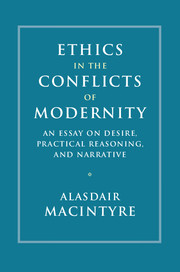Book contents
Preface
Published online by Cambridge University Press: 01 December 2016
Summary
This essay is divided into five chapters. In the first the questions initially posed about our desires and how we should think about them are questions that plain nonphilosophical persons often find themselves asking. When, however, they carry their attempt to answer these questions a little further, they find that they have, perhaps inadvertently, become philosophers and that they need some at least of the conceptual and argumentative resources which professional philosophers provide. So their enquiry, like this one, becomes philosophical. But philosophy in our culture has become an almost exclusively specialized academic discipline whose practitioners for the most part address only each other rather than the educated layperson. Moreover, those same practitioners have for the last fifty years been harassed by the academic system into publishing more and more as a condition for academic survival, so that on most topics of philosophical interest there is by now an increasingly large, an often unmanageably large, body of literature that has to be read as a prologue before adding to it one more item. Readers should be warned that my references to this literature are selective and few. Had I conscientiously attempted not only to find my way through all the relevant published writing in the philosophy of mind and in ethics but then also to explain how I had come to terms with the claims advanced by its authors, I would have had to write at impossible length and in a format that would have made this essay inaccessible to the lay reader for whom it is written.
Nonetheless, I have worked my own way slowly and painfully – the pain is sometimes, although far from always, the pain of boredom – through what matters in that literature and, if I have readers who are professional philosophers, they can be assured that if I make no reference to a vast body of published work, including their own, it is because nothing in it has given me reason to abandon or to modify the views here expressed and the arguments here advanced.
- Type
- Chapter
- Information
- Ethics in the Conflicts of ModernityAn Essay on Desire, Practical Reasoning, and Narrative, pp. ix - xivPublisher: Cambridge University PressPrint publication year: 2016
- 2
- Cited by

